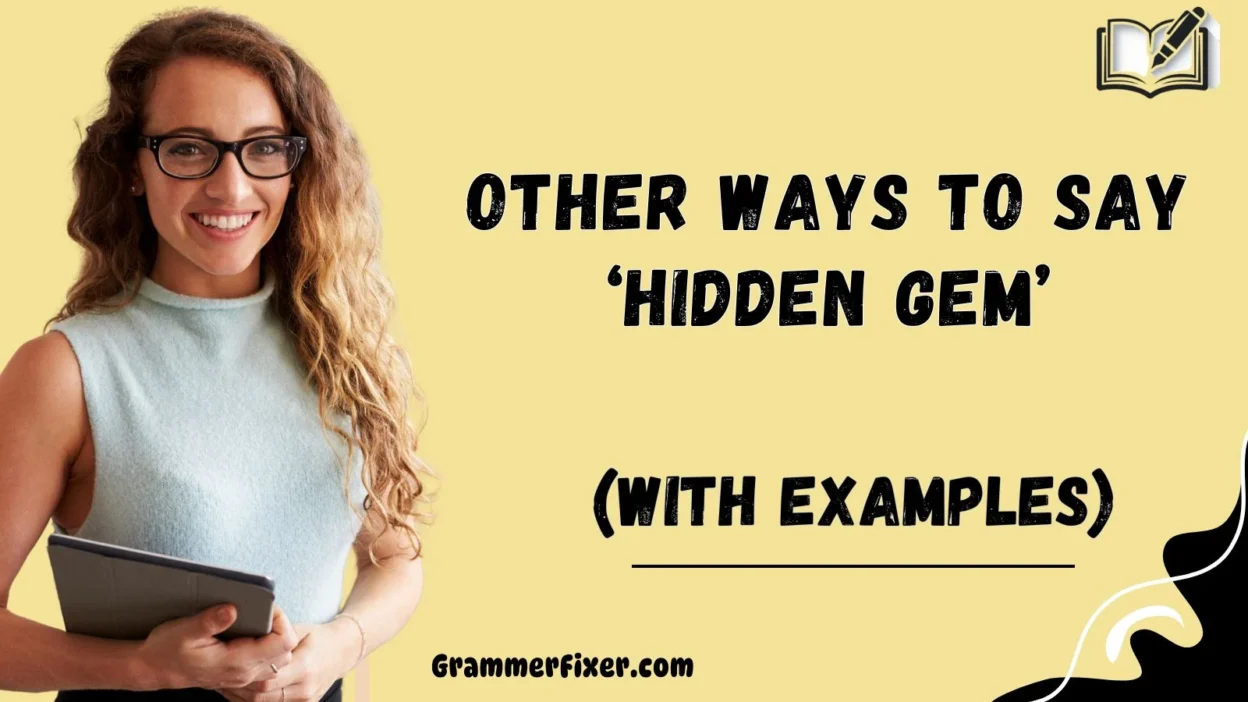Finding the right words can be like offering someone a gift. When we describe something as a “hidden gem,” we’re not just labeling it — we’re showing warmth, appreciation, and care. Using different phrases can help you sound more personal, thoughtful, and empathetic, especially when praising people, places, or experiences that may not always get the recognition they deserve.
Below, you’ll find 30 meaningful alternatives to “hidden gem,” along with examples and insights on how best to use them.
What Does “Hidden Gem” Mean?
The phrase “hidden gem” refers to something or someone valuable, special, or extraordinary that is not widely recognized or appreciated. It captures the joy of discovery and the beauty of finding worth where others may have overlooked it.
When to Use “Hidden Gem”?
You can use “hidden gem” in contexts like:
- Talking about restaurants, cafés, or local spots that aren’t popular yet.
- Describing a talent, person, or skill that deserves recognition.
- Highlighting a book, film, or artwork that isn’t mainstream but is exceptional.
- Sharing a personal discovery that feels rare, beautiful, or meaningful.
Is It Professional/Polite to Say “Hidden Gem”?
Yes. The phrase is polite, positive, and professional. It works well in both formal and casual settings—from describing an employee’s underappreciated talent in a workplace email to talking about a cozy café with friends.
Pros or Cons of Using “Hidden Gem”
Pros:
- Warm, appreciative tone
- Works across contexts (people, places, things)
- Conveys discovery, value, and admiration
Cons:
- Can feel overused in travel blogs or reviews
- May lack specificity if used too casually
1. Undiscovered Treasure
Meaning: Something valuable that hasn’t been found or appreciated by many.
Explanation: Emphasizes the thrill of discovery and the sense that something precious was hidden until now.
Example: “This tiny café is an undiscovered treasure in our neighborhood.”
Best Use: Travel writing, local recommendations, describing small businesses or unique spots.
Worst Use: Formal corporate settings — calling a report or spreadsheet an “undiscovered treasure” may sound awkward.
Tone: Warm, enthusiastic, celebratory.
2. Diamond in the Rough
Meaning: Something or someone with potential that shines despite imperfections.
Explanation: Suggests beauty or value that might need refinement or polishing.
Example: “He’s a diamond in the rough with incredible musical talent.”
Best Use: Talking about people, talents, or projects that are developing.
Worst Use: When describing a professional achievement that’s already refined — it could downplay the effort someone put in.
Tone: Encouraging, supportive, hopeful.
3. Underrated Find
Meaning: Something excellent that isn’t getting the recognition it deserves.
Explanation: Focuses on lack of popularity versus actual value.
Example: “This film is an underrated find—better than most blockbuster hits.”
Best Use: Entertainment, books, films, music, or personal recommendations.
Worst Use: Praising a person directly — it might imply they’re overlooked in a negative way rather than admired.
Tone: Positive, conversational, slightly casual.
4. Masterpiece Waiting to Be Found
Meaning: A creation of great skill or beauty that hasn’t yet gained attention.
Explanation: Suggests artistry, quality, and excellence that remain unnoticed.
Example: “That little gallery in town holds a masterpiece waiting to be found.”
Best Use: Art, literature, music, or design contexts.
Worst Use: Everyday objects like food packaging or clothing tags—it would feel exaggerated.
Tone: Poetic, admiring, reflective.
5. Cult Classic
Meaning: A work or place loved by a dedicated few, even if it isn’t mainstream.
Explanation: Highlights niche admiration and strong loyalty from a smaller group.
Example: “This diner has become a cult classic for late-night eaters.”
Best Use: Films, books, music, restaurants, or quirky spots.
Worst Use: Serious professional settings—it may trivialize important work.
Tone: Playful, affectionate, enthusiastic.
6. Outstanding Find
Meaning: Something that stands out as exceptional once discovered.
Explanation: Focuses on the delight of discovery and clear excellence.
Example: “That vintage bookstore is an outstanding find.”
Best Use: Travel guides, product reviews, recommendations.
Worst Use: In solemn contexts like healthcare or legal discussions—it might sound too casual.
Tone: Positive, celebratory, uplifting.
7. Valuable Discovery
Meaning: Something meaningful or beneficial that you come across unexpectedly.
Explanation: Suggests both practical value and personal joy.
Example: “Networking with her was a valuable discovery for my career.”
Best Use: Professional, academic, and personal growth contexts.
Worst Use: For lighthearted, casual settings—it may sound too formal.
Tone: Respectful, professional, appreciative.
8. Little-Known Jewel
Meaning: A rare and delightful spot or talent not widely recognized.
Explanation: A poetic way to describe something beautiful yet overlooked.
Example: “That small mountain town is a little-known jewel.”
Best Use: Travel writing, lifestyle blogs, cultural experiences.
Worst Use: In technical or scientific communication—it can sound vague.
Tone: Romantic, warm, inviting.
9. Rare Delight
Meaning: Something that brings joy and is hard to come by.
Explanation: Suggests uniqueness and a sense of being lucky to experience it.
Example: “Her laughter is a rare delight that lights up the room.”
Best Use: Compliments, personal expressions, special experiences.
Worst Use: Talking about ordinary tasks or items—it will feel exaggerated.
Tone: Sincere, affectionate, charming.
10. Off the Beaten Path Treasure
Meaning: Something wonderful located away from mainstream choices.
Explanation: Connects to the idea of exploration and adventurous discovery.
Example: “This cabin is an off the beaten path treasure for weekend getaways.”
Best Use: Travel, adventure blogs, exploring locations.
Worst Use: Corporate or formal contexts—it may sound unprofessional.
Tone: Adventurous, exploratory, relaxed.
11. Under the Radar Spot
Meaning: A place, talent, or thing that hasn’t drawn much attention but is excellent.
Explanation: Suggests quiet quality—something good that most people have missed.
Example: “This indie bookstore is an under the radar spot for rare finds.”
Best Use: Travel guides, lifestyle writing, casual conversation.
Worst Use: Academic or highly formal professional contexts.
Tone: Relaxed, conversational, modern.
12. Overlooked Wonder
Meaning: Something marvelous that most people fail to notice.
Explanation: Puts emphasis on beauty ignored by the majority.
Example: “The park near the river is an overlooked wonder.”
Best Use: Describing nature, art, or community places.
Worst Use: Critiquing individuals—it might sound dismissive.
Tone: Warm, admiring, slightly reflective.
13. Quiet Marvel
Meaning: Something stunning that speaks softly, not loudly.
Explanation: Celebrates subtle beauty or brilliance that doesn’t seek attention.
Example: “Her work is a quiet marvel of patience and creativity.”
Best Use: Describing people, talents, or art.
Worst Use: High-energy or commercial contexts like advertising—it won’t fit the tone.
Tone: Gentle, reverent, appreciative.
14. Uncharted Beauty
Meaning: Something untouched or undiscovered that holds natural or artistic value.
Explanation: Suggests exploration and discovery of new territory.
Example: “The valley is an uncharted beauty waiting for hikers to explore.”
Best Use: Nature, travel, landscapes, adventurous writing.
Worst Use: Professional or business contexts—it sounds overly poetic.
Tone: Adventurous, inspiring, imaginative.
15. Cloistered Haven
Meaning: A peaceful, tucked-away refuge.
Explanation: Focuses on privacy, safety, and serenity.
Example: “That garden feels like a cloistered haven away from the city noise.”
Best Use: Travel, wellness, personal reflections.
Worst Use: Casual small talk—it might sound too dramatic.
Tone: Comforting, tranquil, poetic.
16. Well-Kept Secret
Meaning: Something great that only a few people know about.
Explanation: Suggests intentional exclusivity or simply being overlooked.
Example: “This jazz bar is the city’s well-kept secret.”
Best Use: Restaurants, venues, local spots.
Worst Use: Professional achievements—sounds too informal.
Tone: Playful, casual, friendly.
17. Uncelebrated Talent
Meaning: A person with skills who hasn’t received proper recognition.
Explanation: Shines a light on human ability and worth.
Example: “She’s an uncelebrated talent whose art deserves the spotlight.”
Best Use: Professional recognition, art, music, work contexts.
Worst Use: Places or objects—it’s people-focused.
Tone: Respectful, uplifting, supportive.
18. Obscure Jewel
Meaning: Something rare and precious that isn’t widely recognized.
Explanation: Combines rarity with mystery and subtle elegance.
Example: “That novel is an obscure jewel of modern literature.”
Best Use: Literature, art, culture.
Worst Use: Talking about people—it might sound odd.
Tone: Literary, refined, admiring.
19. Lesser-Known Trove
Meaning: A collection of things that are valuable but not widely known.
Explanation: Suggests an abundance of overlooked treasures.
Example: “The library is a lesser-known trove of historic documents.”
Best Use: Museums, libraries, historical sites.
Worst Use: Praising individuals—it implies objects, not people.
Tone: Informative, respectful, cultural.
20. Underappreciated Wonder
Meaning: Something or someone remarkable that doesn’t receive enough admiration.
Explanation: Highlights lack of recognition despite obvious quality.
Example: “That seaside village is an underappreciated wonder.”
Best Use: Locations, art, small businesses, or cultural works.
Worst Use: Trivial or joking contexts—it deserves seriousness.
Tone: Empathetic, thoughtful, uplifting.
21. Unnoticed Marvel
Meaning: Something extraordinary that people walk past without recognizing.
Explanation: Suggests brilliance hiding in plain sight.
Example: “That mural downtown is an unnoticed marvel.”
Best Use: Art, community, culture, overlooked landmarks.
Worst Use: Describing people directly—it could sound dismissive.
Tone: Respectful, reflective, admiring.
22. Hidden Haven
Meaning: A peaceful place tucked away from noise or crowds.
Explanation: Focuses on comfort, safety, and serenity.
Example: “This park is a hidden haven for anyone who loves quiet walks.”
Best Use: Travel, nature, wellness, lifestyle writing.
Worst Use: Talking about abstract ideas—it works best with places.
Tone: Comforting, calming, warm.
23. Forgotten Treasure
Meaning: Something once valued but now overlooked.
Explanation: Suggests rediscovery of past beauty or worth.
Example: “That old cinema is a forgotten treasure of our town.”
Best Use: Historical places, traditions, cultural artifacts.
Worst Use: Praising a living person—it can sound unkind.
Tone: Nostalgic, reverent, thoughtful.
24. Overlooked Jewel
Meaning: Something beautiful that hasn’t been given its due attention.
Explanation: Combines beauty and neglect in a gentle, respectful way.
Example: “Her poetry is an overlooked jewel of our generation.”
Best Use: Artistic, literary, or creative works.
Worst Use: Corporate settings—it sounds too flowery.
Tone: Elegant, poetic, admiring.
25. Rare Find
Meaning: Something unique and special, not easily discovered.
Explanation: Highlights the serendipity of discovery.
Example: “That second-hand bookstore is a rare find.”
Best Use: Travel, shopping, reviews, casual conversation.
Worst Use: Highly formal contexts—it can sound too lighthearted.
Tone: Warm, casual, enthusiastic.
26. Unpolished Gem
Meaning: Something with value that isn’t fully developed or refined.
Explanation: Suggests potential waiting to be realized.
Example: “This band is an unpolished gem with raw talent.”
Best Use: Early-stage talent, ideas, or projects.
Worst Use: Praising completed professional work—it could feel insulting.
Tone: Supportive, hopeful, encouraging.
27. Secret Spot
Meaning: A special location known only to a few.
Explanation: Suggests exclusivity and intimacy.
Example: “That riverside café is our secret spot.”
Best Use: Travel, local life, relationships, personal experiences.
Worst Use: Professional or academic contexts—it sounds too casual.
Tone: Playful, personal, intimate.
28. Treasure Trove
Meaning: A rich collection of valuable or delightful things.
Explanation: Implies abundance and richness.
Example: “This museum is a treasure trove of ancient artifacts.”
Best Use: Museums, libraries, collections, discoveries.
Worst Use: Describing individuals—it works better for groups or objects.
Tone: Excited, respectful, descriptive.
29. Unsung Wonder
Meaning: Something amazing that hasn’t received enough recognition.
Explanation: Celebrates worth that remains unacknowledged.
Example: “That play is an unsung wonder of modern theatre.”
Best Use: Art, performances, community efforts.
Worst Use: Light, jokey contexts—it should be used sincerely.
Tone: Empathetic, respectful, admiring.
30. Quiet Treasure
Meaning: A simple, understated source of joy or beauty.
Explanation: Focuses on gentle appreciation rather than grandeur.
Example: “Her kindness is a quiet treasure in our team.”
Best Use: Personal expressions, heartfelt compliments.
Worst Use: Marketing or sales—it may feel weak in persuasive writing.
Tone: Gentle, warm, sincere.
Conclusion
The phrase “hidden gem” has many beautiful alternatives, each carrying its own nuance, tone, and context. Whether you want to sound casual, poetic, professional, or heartfelt, choosing the right synonym can help you express admiration with more warmth and precision.



